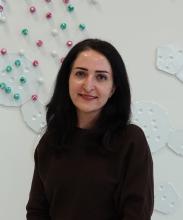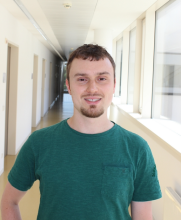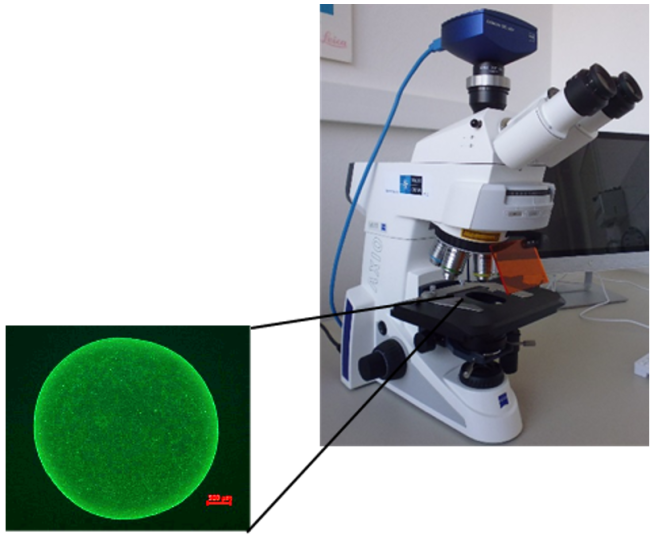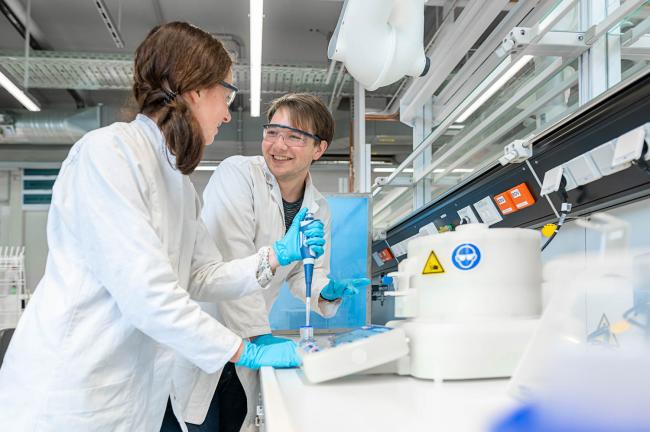
The Biosensors working group at the Institute for Nanoscale and Biobased Materials specializes in the development of novel, miniaturized biosensor platforms for various applications. Our focus is on the further development of electrochemical, optical, electromechanical and MEMS biosensors.
Our group excels in developing biosensor assays that integrate biomolecules and micro/nanocomposites with MEMS technology and microfluidic systems. Recently, we have been exploring the use of biomimetic materials as receptors to expand the potential of biosensing. Our goal is to be innovative at the interface of different disciplines and to advance biosensing.
Do you want to work or cooperate with us? Then please contact Dr. Parvaneh Rahimi (parvaneh [dot] rahimi [at] esm-tu-freiberg [dot] de).
Expertise
Projects
CONSENS - Flexible and wearable chemical sensors based on conductive composite materials
CONSENS focuses on the development of new handheld sensors for the detection of organophosphorus, triazine and phenol pesticides in food and water, based on molecularly imprinted polymers linked at the molecular level with carbon nanomaterials (graphene, carbon nanotubes, graphene -Nanoribbons). The carbon nanocomposites offer excellent conductivity and robustness, while the molecularly imprinted polymers provide specificity and selectivity. Conductive ink based on these hybrids is 2D printed onto gloves to create sensor platforms for real-time on-site screening. “On-finger” detection in a wide range of samples meets the requirements of various environmental and safety applications and enables rapid response in protection and remediation of contamination.
Partners: Spain, Serbia, Macedonia, Germany
Period: 2023 - 2026
Further information: https://consensproject.com/
Development and characterization of an aptamer-based MEMS biosensor array for the detection of multiple environmental pollutants
As part of the project, a novel, mobile sensor is to be developed for the detection of substances that are harmful to the environment or health, such as antibiotics and endocrine disruptors in water and wastewater, in relevant concentrations by combining technologies from biosensors and microsystems technology.
Period: 2023-2025
Multiple amplified Raman sensing in microfluidic systems
The aim of the project is to develop a digitally adaptable microfluidic sensor platform that allows highly sensitive on-site detection of chemical or biological species in the areas of food and environmental analysis as well as medical diagnostics. In order to enable highly selective and efficient detection of application-relevant chemical or biological target molecules, the project is pursuing three, not yet combined, strategies for a highly amplified sensor signal:
(1) Exploiting principles of molecular recognition
(2) Exploitation of the surface-enhancing Raman effect: The selected bioreceptors will be immobilized on metal nanoparticles (e.g. Au, Ag, or core-shell nanoparticles) in order to achieve the known amplification effect of Raman scattering (SERS=Surface Enhanced Raman Scattering) induced by metal surfaces).
(3) Exploiting light-conducting properties of aerogel-functionalized microfluidic channels
ESF Plus doctoral funding
Period: 2023-2027
Further information: https://tu-freiberg.de/forschung/esf-promotionsfoerderung/esf-plus-gefoerderte-nachwachsenforschungsgruppen-und
Biofunctional hydrogels for MEMS
The aim of the project is the synthesis and functionalization of hydrogels with biomolecules and their use as a sensitive layer for the development of a MEMS-based multi-analyte sensor that enables on-site analysis of the desired analytes. In addition to the direct binding of bioreceptors (such as aptamers, DNA or antibodies) to the mobile membrane, biofunctionalized hydrogels as sensitive materials are promising alternatives in capacitive MEMS. Different biofunctionalized hydrogels will be developed as sensitive layers in order to integrate them into capacitive MEMS and validate them for multi-analyte measurement of chemical or biological species in the areas of food and environmental analysis as well as medical diagnostics.
ESF Plus doctoral funding
Period: 2023-2027
Further information: https://tu-freiberg.de/forschung/esf-promotionsfoerderung/esf-plus-gefoerderte-nachwachsenforschungsgruppen-und
Erasmus+ program
Mobility for learning purposes for students and staff in higher education.
Germany-Iran-Iraq
Period: 2023-2025
TUBAF – Africa ERASMUS+ program
Erasmus doctoral student scholarship
Development of biosensors for the detection of progestron and their use as practical diagnostic options in Nigeria (Dr. Chidimma Akudo Omeke)
Development of MIP sensors for the detection of heavy metals and PAH in water and possible application in Kenya (Msc. Mwende Tomno Rose)
Germany-Kenya-Nigeria
Period: 2024
AI-based Data Fusion for Physiological Multisensor Technology on Wearables
Completed Projects
Electrochemical biochip for near-patient diagnosis of liver cancer
In order to develop patient-oriented analysis and thus a reliable diagnostic system for liver cancer, the project aims to develop a bio-chip with an integrated electrochemical biosensor based on microRNA-122 as a biomarker.
ESF doctoral funding
Period: 2020-2023

Dr. rer. nat. Parvaneh Rahimi
Dr. Parvaneh Rahimi is currently group leader of the biosensors research group at the Institute for Nanoscale and Bio-based Materials (INBM) at the TU Bergakademie Freiberg.
She completed her master's degree in electrochemical sensors at the University of Yazd in 2007 and received her PhD in analytical chemistry in the field of electrochemical biosensors at the University of Tehran in 2011. Her research focuses on the integration of biological molecules or biomimetic materials with micro/nanocomposites with an appropriate detection system, especially electrochemical, optical and electromechanical systems, to develop novel (bio)sensors for various applications.
Email: parvaneh [dot] rahimi [at] esm [dot] tu-freiberg [dot] de
Dipl. Ing. Hannes Stapf
Dipl. Ing. Hannes Stapf studied nanotechnology at the TU Bergakademie Freiberg between 2016 and 2022 and delved into the subject area of biosensors during his studies. He worked on the aptamer functionalization of various surfaces. He wrote his diploma thesis on the topic of “Antibiotic detection using an aptamer-based MEMS biosensor”. Since October 2022, Mr. Stapf has been working on his doctorate on the topic “Development and characterization of an aptamer-based MEMS biosensor array for the detection of multiple environmental pollutants” at the Institute for Nanoscale and Biogenic Materials (INBM).
Email: hannes [dot] stapf [at] doktorand [dot] tu-freiberg [dot] de
Dipl. Ing. Lara Jakob
Lara Jakob is a doctoral student at the Institute for Nanoscale and Bio-Based Materials in the Biosensors working group. In 2023, she successfully completed her degree in nanotechnology at the TU Bergakademie Freiberg, where she focused on bio- and nanoanalytics.
Already during her studies she devoted herself intensively to light and liquid conductors for optical sensors. She wrote both her coursework and her diploma thesis on the function and production of optofluidic light guides for Raman spectroscopy. In her doctorate, she builds on these experiences and deepens her research in the area of multi-amplified Raman sensing in microfluidic systems.
This project is supported as part of the state innovation funding, financed by the European Social Fund Plus (ESF Plus) in the Free State of Saxony for the funding period from 2023 to 2027.
Email: lara [dot] jakob [at] doktorand [dot] tu-freiberg [dot] de
Dipl. Ing. Maximilian Lippold
Dipl. Ing. Maximilian Lippold completed his studies in nanotechnology with a diploma thesis on Raman signal amplification in aerogel-coated capillaries in August 2023. As part of his doctorate at the Institute for Nanoscale and Bio-Based Materials, which is supported by an ESF scholarship, he is working on the topic of biofunctionalized hydrogels for MEMS.
Email: maximilian [dot] lippold [at] doktorand [dot] tu-freiberg [dot] de

M. Sc. Sedigheh Falahi
Sedigheh Falahi received her bachelor's degree in physics in 2013, followed by a master's degree in nanotechnology/nanophysics in 2017, both in Iran. Her master's thesis focused on the development of electrochemical DNA-based sensors for the detection of tumor markers, emphasizing on the application of nanotechnology for medical advancement.
Since 2020, Ms. Falahi has been doing her doctorate at the TU Freiberg and is working in the biosensors working group there. Her current research focuses primarily on the development of innovative electrochemical (bio)sensors with a particular focus on medical diagnostics and food monitoring. This demonstrates her commitment to applying her expertise in nanotechnology to diverse and critical areas of public health and safety.
Email: sedigheh [dot] falahi [at] doktorand [dot] tu-freiberg [dot] de

M.Sc. Sven Lobner
Sven Lobner has been a doctoral student at the Institute for Nanoscale and Biobased Materials since June 2024. In his doctorate, he is working on the topic of "AI-based data fusion for physiological multisensor technology on wearables". He completed his bachelor's and master's degrees in the interdisciplinary Biomedical Engineering program at Chemnitz University of Technology with a focus on image processing and telemedicine. In his thesis, he devoted himself to the innovative approach of contactless recording of respiratory parameters using a UWB radar and structure-borne sound.
This project is funded as part of an industrial doctorate by the European Social Fund Plus (ESF Plus) or the Free State of Saxony, respectively, as well as the Fraunhofer Institute for Electronic Nano Systems ENAS in the funding period from 2024 to 2028.
E-Mail: sven [dot] lobner [at] doktorand [dot] tu-freiberg [dot] de



